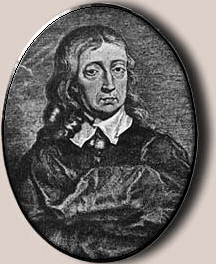John Milton's Biography

"What in me is dark Illumine, what is low raise and support, That to
the height of this great argument I may assert eternal Providence,
And justify the ways of God to men."
Born in Bread Street, London, the son of John Milton, scrivener and composer of music, Milton attended St Paul's School before entering Christ's College, Cambridge (1625-1632).
His life falls into three convenient parts: student and early poems; controversy and prose; retirement and later poems.
The first part embraces Cambridge and, having given up the idea of holy orders, six years of study at Horton, near Windsor (1632-1638) and a period of travel in France and Italy (visiting Grotius at Paris and Galileo at Florence), before returning to London to teach his nephews and prepare himself to write the great poem he felt was his main object in life.
Civil disturbance and controversy started his next phase of activity. From 1641 to 1660 he was engaged either in prose controversy in English and Latin or (from 1649) as Secretary in Foreign Tongues to the Council of State, serving as a loyal, courageous and supremely talented supporter of Cromwell and the free commonwealth cause. It was during this period that his eyesight - poor from 1644 - failed, leading to blindness in 1652. Briefly in custody in 1660 at the Restoration, Milton was - incredibly - included in the amnesty (due, so we are told, to the intercession of his friend Andrew Marvell).
The remainder of his life was spent in retirement with, from 1663, his third wife and a servant, composing and dictating his verse and receiving numerous visitors from home and abroad.
Home/God/Satan/Adam&Eve/Trinity/Pandemonium